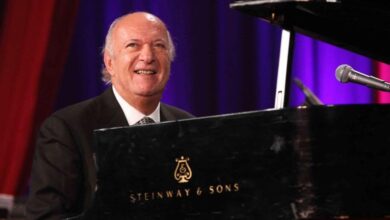Oxmo Puccino is a French rapper of Malian origin who received a Victoires de la Musique award at the beginning of 2010 for his fifth album, L’Arme de Paix (Weapon of Peace), after a 15-year career in the music industry.
Puccino’s unique writing mixes stylistic devices and metaphors with hard-hitting lyrics.
While in Cairo to perform on the River Hall stage at El Sawy Culture Wheel tonight–he was invited by the French Cultural Center– Puccino took time with Al-Masry Al-Youm to sit down for a Turkish coffee and look back on his artistic journey.
Al-Masry Al-Youm: You said to a French hip hop magazine that when you were younger, you never thought rap would become your profession. How so?
Oxmo Puccino: At the time I was just a teenager in a group of young guys struck by a musical phenomenon coming from the US. People around us didn’t really get it, and we had the feeling that we had understood something before everybody else. Of course, at that time it seemed truly impossible to imagine that one day this could be bankable. To be respected and recognized in this small community was the greatest thing we could think of.
With the craze of the audience and the broadcasting on some major radiowaves we understood that the phenomenon was getting bigger. Then you start getting contracts and making a bit of money, and for sure when you start dealing with all the administrative problems you know it has really become a job.
Al-Masry: It’s true that throughout your career you’ve had the reputation of not following the main current, artistically speaking.
Puccino: From the very beginning I was considered an original, with his own musical universe.
Al-Masry: Your first album Opera Puccino was a real success, while the second one, L’Amour est Mort was not well received. Do you link this to your intention to do something out of the box?
Puccino: The album is rooted in a very dark period of my life, when things started to go really badly. Many people died around me, and the upheaval that music created in my life, my artistic research and my own personal situation combined, plunged me into a very dark atmosphere.
The difference today is that we’ve had time to get used to this state of general depression. Also, this album was released when French rap was already declining. So L’Amour est Mort is wrapped up by this dark veil. I saw it as a black spot that I could escape from, to do what I’m doing now and what I will do later. Not only did it give me a momentum, but it gave me a philosophy.
To make it brief, the world as we know it has nothing to do with affection or human depth, and people don’t want to accept this.
Al-Masry: You just received the Victoires de la Musique award in the urban music category. What does this reward stand for?
Puccino: I am not the kind of person who waits for awards, so this makes it very special. To be rewarded with this prize 15 years since the beginning of my career is important for me, but is even more important for the people I worked with all this time. Behind each artist there are people in the shadows, and the success of an artist depends a lot on these people. There is not so much chance involved, but a lot of work, failures, conflicts and so on to get there, but this is not something that people see.
Also, on a national level, it means something because I have been professionally awarded and this signifies that I have become a music professional. Nobody can say today that I am not an accomplished artist.
Al-Masry: Do you consider that rap as a musical style is still confined and restricted to a certain social class?
Puccino: Rap is not confined in any way, but the political and media discourse about rap is. Some people do not have a clue what’s going on. They come to me and tell me “rap is violent, rap is misogynist” and so on.
Rap is much more than a style of music: It’s a state of mind. To me, rap is the modern artistic revolutionary movement. Every rapper in any country mixes this conception of rap with his local culture, with a language immersed in the context he has evolved in. Rap to me is the last transmitter of popular sincerity. Also, rappers were instantly taken very seriously by politicians and this is also a sign.
Al-Masry: Are you preparing a new album?
Puccino: Not at all. I am currently writing for female singers.
Al-Masry: What do you expect from your show tonight in Cairo?
Puccino: Only bliss, honestly. And whenever I do a concert in Africa, be it Mali, Burkina or Egypt, I never come back home exactly the same. And this is something to cherish.
Concert tonight at 9 PM, River Hall, El Sawy Culture Wheel, Zamalek.




